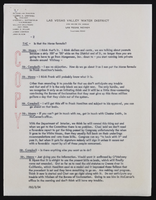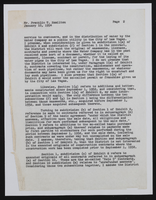Search the Special Collections and Archives Portal
Search Results

Transcript of interview with Helen Cecil by Susan Vogel, March 16, 1978
Date
Archival Collection
Description
On March 16, 1978, Susan Vogel interviewed Helen Cecil (born November 4, 1916 in Silver City, Utah) in her home in Las Vegas, Nevada. She relocated to Las Vegas with her parents for health reasons. This interview covers family life, education, employment and the growth and development of Las Vegas. Helen attended Las Vegas High School and then went on to work at the Las Vegas High School for many years, an accomplishment that she is extremely proud of. During the interview she also mentions the Boulder Dam, the Old Ranch, and the Westside.
Text

Transcript of interview with Alice Doolittle by Christopher Moran, March 21, 1977
Date
Archival Collection
Description
On March 21, 1977, Christopher Moran interviewed Alice Doolittle (born 1897 in Boston, Massachusetts) about her experiences while living in Nevada. Also present during the interview is Ruth Belding, Alice’s daughter. Doolittle first talks about her reasons for coming to Las Vegas and her eventual occupation as a dental assistant. She also talks about her family’s history of living on the Stewart Ranch and the ranch’s swimming pool that attracted many during the summers of Las Vegas. Doolittle also describes her move to Boulder City with her husband, the first theaters in Las Vegas, and the Union Pacific Railroad. At the end of the interview, the three discuss Helen Stewart, Harley Harmon, and the Doolittle Center, named after Doolittle’s late husband, Ferris Doolittle.
Text

Transcript of interview with Kim Bird & Pam Fogliasso by Claytee D. White, February 8, 2013
Date
Archival Collection
Description
Kim Bird's family moved to Las Vegas in 1955 when she was twelve years old. Pam Fogliasso arrived in 1954 with her family in 1954, when she was ten. Kim married and had a son and a daughter; she lives in Las Vegas. Pam married, had two children, and lives in Parumph, Nevada. Though Kim and Pam moved here in the mid-1950s, they had family members who had lived in Southern Nevada and worked on building Hoover Dam - Kim's grandfather and Pam's great-uncle. Both women remember growing up in a Las Vegas that was run by the mob and safe for teenagers; meeting friends in local hangouts such as the Blue Onion and attending sock hops, babysitting, and cruising down Fremont Street. They attended high school with black students but were also aware of the segregation that existed on the Strip. This interview focuses on Kim and Pam's experiences growing up in Las Vegas, and on their teenaged years attending Rancho High School.
Text

Transcript of interview with Florence McClure by Joanne Goodwin, January 24, 1996 & February 6, 1996
Date
Archival Collection
Description
Florence McClure came to Las Vegas later in her life, but the state felt her presence and the community her contributions as if she were a native daughter. Introduced to the League of Women Voters in 1967, McClure met her political mentor Jean Ford and learned how to practice the core elements of democracy. She put those tools to work in a number of ways, however her participation in the creation of the Rape Crises Center and her advocacy for locating the women’s prison near Las Vegas are two of her long-lasting efforts. Florence Alberta Schilling was born in southern Illinois where she enjoyed the security of a tight-knit family and the independence to test her abilities growing up. She graduated from high school and attended the MacMurray College for Women at Jacksonville. With the attack on Pearl Harbor in 1941, she began a series of jobs working for the war effort. She moved to Ypsilanti, Michigan with a girlfriend to work at the Willow Run Army Airbase and then moved to Miami, Florida where she worked for the Provost Marshall in the Security and Intelligence Division. She met her husband, James McClure, at the time and they married in 1945. During the next several years, they raised a family and moved around the country and to Japan with the military. McClure came to Las Vegas in 1966 as part of her work in the hotel industry which she engaged in after her husband’s retirement from the military. She had worked in California and Miami Beach, but it was Burton Cohen in Los Angeles who invited her to join him in a move to Las Vegas to build the new Frontier Hotel and Casino. Following the completion of the Frontier, she moved to the Desert Inn with Cohen in 1967 and worked as the executive office manager. After a few years, she decided to leave the industry and complete her college education. She graduated from UNLV in 1971with a BA in Sociology with an emphasis on criminology. She was 50 years old. McClure had been a member of the League of Women Voters for a few years at that point and had learned the political process from Jean Ford and workshops on lobbying. She had numerous skills that were waiting to be tapped when she attended an informational meeting on the incidence of rape in the Las Vegas valley. From that meeting, a small group of individuals, including McClure, began the organization Community Action Against Rape (later renamed the Rape Crisis Center) in 1973. It was the first agency in the area devoted to serving individuals who had been assaulted and changing the laws on rape. The organization’s first office was set up in McClure’s home. Over the next decade, she worked to change attitudes and reshape policy by constantly raising the issues of sexual assault with police officers, emergency room doctors, judges, and legislators. Her role as an advocate took her into hospital emergency rooms and courtrooms to assist victims. It also took her to the state legislator to lobby repeatedly for a change in laws. During this period, journalist Jan Seagrave gave McClure the nickname “Hurricane Florence” - a fitting moniker that captured the force with which McClure attacked the issue. As a result of her efforts and those of the people with whom she worked, we now 1) recognize rape as a crime of assault; 2) forbid the sexual history of a rape victim from being used against her in court; and 3) recognize marital rape. In addition to learning about Florence McClure’s activities, the reader of this interview will gain information on the role of civic organizations like the League of Women Voters in engaging the voluntary efforts of women in the post-war years.
Text

Transcript of interview with Judith L. Hamblin by Margaret Stambro, March 30, 1976
Date
Archival Collection
Description
On March 30, 1976, collector Margaret Stambro interviewed schoolteacher and registered medical stenographer, Judith L. Hamblin (born June 11, 1941 in Las Vegas, Nevada) in her home in Henderson, Nevada. This interview covers the history of Henderson, local schools and teachers, and Helldorado. Also during this interview, Mrs. Hamblin discusses her fondness for Lake Mead, the Basic Magnesium Plant, Nellis Air Force Base, and the early aboveground atomic blasts.
Text

Ruby C. Leavitt interview, November 30, 1986: transcript
Date
Archival Collection
Description
On November 30, 1986, collector Patton Alberti interviewed Ruby Canonic Leavitt (born 1907 in Genoa, Nevada) at her home in Reno, Nevada. Mrs. Leavitt discusses her time as a teacher in Verdi, Nevada, as well as other places in Northern Nevada. She also discusses the changes she has seen in teaching and in the towns she has lived in over time.
Text

Mary Leo interview, February 27, 1980: transcript
Date
Archival Collection
Description
On February 27, 1980, Rafael Reyes-Spindola interviewed Mary Leo (b. Mary Susanne Kaime Leo in 1949 in Santa Barbara, California) about her life growing up in the Las Vegas Valley and her varied career path. Leo, having moved to Las Vegas as a toddler, talks about what the city was like when she arrived, the landscape, schooling and local life in general. She remembers the construction of the University of Las Vegas, Nevada and the growth of the city and population. Through her anecdotes, Leo shares the local attitude towards the Strip that Las Vegans develop as a result of being raised in the city and focuses the beginning half of her interview on life outside of the Strip. The interviewer and Leo move their conversation towards her career path, beginning in a coffee shop at the Riviera Hotel & Casino, her time in the travel industry, as a Las Vegas showgirl in the famed Folies Bergere show, her return to the Riviera as the director of sales and catering, and the legacy she hopes to leave behind with her career.
Text

Meeting minutes for Consolidated Student Senate University of Nevada, Las Vegas, March 11, 2002
Date
Archival Collection
Description
Text


